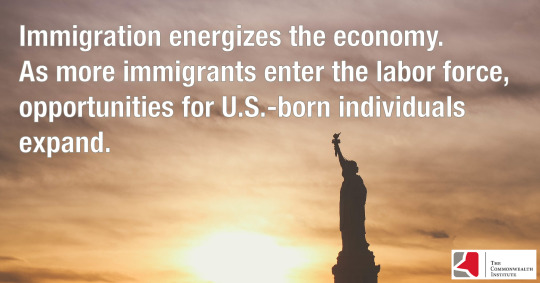July 18, 2018
Immigration Has Broad Benefits by Increasing Opportunity
One in eight Virginians is an immigrant to the United States. New Virginians often come seeking a better life for themselves and their families. And Virginians – whether born-heres or come-heres – value that Virginia is a good place to raise a family. The good news is that there is a general consensus among economists that immigration energizes the economy and expands opportunity for U.S.-born individuals as well. A new report provides critical new information on how.
Immigrants represent 12 percent of Virginia’s population and 16 percent of the labor force. And as the immigrant share of the population rises, there have been unfounded concerns regarding immigration’s effect on wages for U.S.-born workers and other economic implications of immigration. However, there is a consensus among most economists that immigration has significant positive effects on the economy and does not reduce wages for U.S.-born workers in the long run.
Last month, the National Foundation for American Policy (NFAP) released a major report examining immigration’s effects on the unemployment and labor force participation rates of U.S.-born individuals. Using data from the U.S. Census Bureau’s American Community Survey, NFAP found that immigration does not increase unemployment or decrease labor force participation among U.S. natives. In fact, the study found that a 1 percent increase in the immigrant share of the labor force, in turn, decreases U.S.-born unemployment by 0.062 percentage points and increases U.S.-born labor force participation by 0.045 percentage points.
This means that as more immigrants enter the labor force, U.S.-born workers can benefit. This new study suggests that as more immigrants enter the labor force, more U.S.-born individuals enter the labor force and fewer are unemployed as a result.

Economists across the country agree that immigration invigorates the economy by increasing the number of workers, consumers, and new business owners. An energized economy simultaneously expands opportunities for U.S.-born individuals to enter the labor force and increased immigration actually helps college-educated U.S.-born people increase their wages. Overall, immigration has been shown to promote innovation, worker specialization, and productivity.
Nevertheless, the positive effects of immigration do not reach every U.S.-born person who is looking for work. For marginalized groups of U.S.-born workers, certain labor force practices neutralize immigration’s positive impact on the labor market. In particular, racism acts as a major barrier for employment of Black Americans, particularly Black men. A recent extensive study on wealth and income revealed that Black boys fare much worse than their white counterparts when they reach adulthood, whether they come from poor or wealthy backgrounds and regardless of their family structure and education level. It is critical that we look for ways to improve working conditions and outcomes for people – particularly Black men – with less formal education while also harnessing the overall economic gains of immigration. The alternative – restricting immigration in the hopes of protecting wages for people with less formal education – is not a winning formula for economic growth.
While deeply embedded structural forces still prevent certain groups of U.S.-born individuals from thriving in the labor market, immigration proves to boost our country’s economy without the negative effects that are often feared. Immigration’s modest but positive impacts on wages, labor force participation, and economic growth confirm its benefits in helping create an economy with more opportunity for everyone.
Category:
Economic Opportunity
